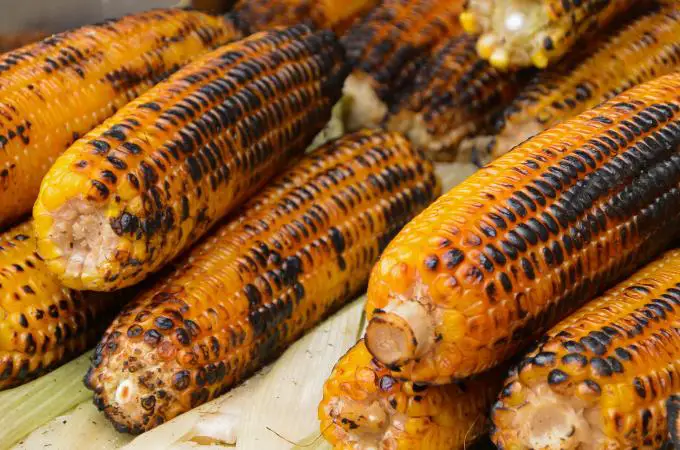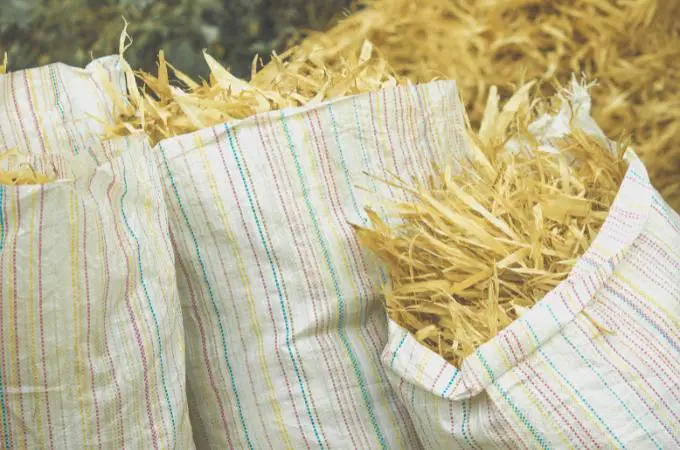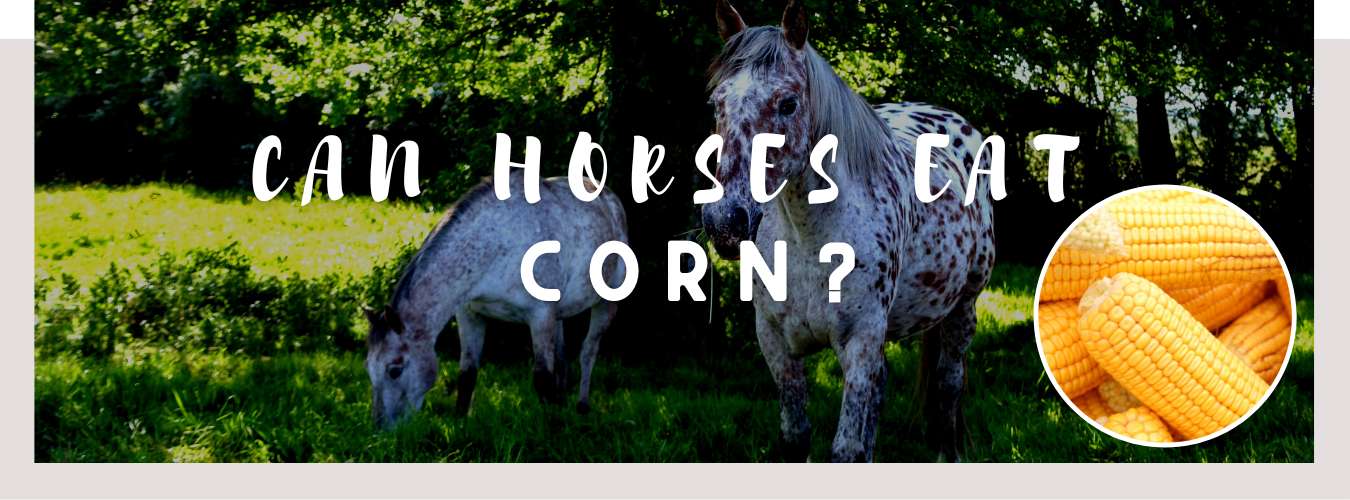
A classic summer treat for many of us is crunching down on sweet-tasting corn on the cob. Much like when you crunch down on an apple or a carrot, some of us have asked: Can horses eat corn?
Yes, horses can eat corn. Corn is a palatable grain that gives a lot of energy, making it ideal for horses to maintain an excellent body condition. It is perfect for horses with a high activity level, such as working and performing horses.
This article will cover the nutritional value, benefits, risks, and more when feeding corn to horses.
Nutritional Value of Corn
The nutritional profile of North American corn.
| Nutrient Name | % Amount |
| Dry Matter | 87.2 % |
| Crude Protein | 9.5 % |
| Crude Fibre | 2.3 % |
| NDF | 11.9 % |
| ADF | 3.1 % |
| Lignin | 0.6 % |
| Starch | 73.1 % |
| Total Sugars | 3.1 % |
| Digestible Energy | 1.54 Mcal |
| Calcium | 0.2 g |
| Phosphorus | 2.9 g |
| Magnesium | 1.2 g |
| Potassium | 3.5 g |
| Zinc | 23 mg |
| Copper | 2 mg |
| Iron | 21 mg |
You might also like: Can Horses Eat Cheese?
Benefits Of Feeding Horses Corn On The Cob
Vitamin A:
Vitamin A functions as a powerful antioxidant for horses, functioning in all important ways in their systems. The vitamin works to support their reproductive functions and vision and gives another significant boost to their immune system.

Starch:
Corn has a lower fiber but a higher starch content than other grains such as oats. Also, it can produce twice as much energy as oats per volume. Therefore, be very careful with your horse’s weight, especially when they do not have an effective way of utilizing the extra energy.
Energy:
Corn has a variety of value in a horse’s diet, but it is primarily added to feed as an energy source. It is one of the most energy-dense feeds, with a digestible energy value that is more than twice that of oats at a whopping 1.54 Mcal of digestible energy (DE) per pound.
Corn has high energy content per weight and a high weight per unit volume. Therefore, feeding a volume of Corn thus provides a horse two to three times more energy than that same volume of oats. So attention to weight is necessary when feeding Corn.
Potassium:
Potassium plays an essential role in normal muscle contraction and relaxation. It also controls the osmatic pressure.
Risks of Feeding Horses Corn on the Cob
Too Much Starch:
You should take care when feeding corn to horses. As with most cereal grains, it’s best not to provide large quantities at any one time.
Starchy foods like corn are digested in the small intestine, but if a horse overeats, some of them may enter the large intestine undigested. It will upset the balance of good bacteria in the large intestine, which is supposed to digest fiber. It could lead to digestive upsets such as diarrhea, colic, and laminitis.
Hyper-activity:
When you see a horse with corn in its diet that is acting hyper, more often than not, it’s due to an owner who substituted straight corn for an equal volume of another grain in their horse’s diet. They unknowingly supplied more than twice the energy to their horse in the same amount.
Digestive Issues:
An older horse or horse with dental issues needs an easy-to-chew and highly digestible source of nutrients to maintain its health and condition. They have a more challenging time with digestion.
These horses will have difficulty eating whole corn. In addition, struggling to chew and feed properly can compromise the rest of the digestion process, often resulting in weight loss.
Mycotoxins:
Corn is susceptible to various molds that can produce mycotoxins that seriously affect horse health.
This danger is more prevalent in states with warm, humid climates during the corn growing season. The mycotoxin fumonisin can infect the corn kernel, and unfortunately, horses will readily eat contaminated corn since the fumonisin toxin doesn’t decrease the corn’s palatability.
Fumonisin causes a neurological condition called equine leukoencephalomalacia (ELEM), also known as moldy corn disease.
ELEM causes the degradation of the white matter of the horse’s brain, resulting in blindness, coordination problems, and death.
Genetically Modified Organisms:
You might want to know that 86% of all U.S. Corn products are Monsanto GMO and are carcinogenic. Next to soy, corn is one of the most prevalent genetically modified foods in the US food supply.
You might also like: Can Horses Eat Grapes?
Can Horses Eat Corn Cob?
The cob boosts the fiber content of corn. Its kernels only contain around 2% fiber makeup, but the cob increases that number significantly.
Horses tend to enjoy cobs for chewing once they have finished eating the grains. Cobs should not, however, be introduced as the primary food source or a regular part of the diet.
Can Horses Eat Corn Husk?

Like all the other parts of the corn, toxins can also grow on husks. If any sign of fungus or mold can be seen, do not feed it to your horse.
There is little nutritional value for horses found in the husk but little else of concern. Horses shouldn’t be eating corn husks as a regular part of their diet, but a chomp here and there, provided there is no fungus, should not harm them.
Can Horses Eat Corn Stalk?
Corn stalks are often used as part of horse bedding. And while not primarily used as a food source, the same careful consideration should be given to the kernels because stalks are just as susceptible to that same toxic fungus.
How to Feed Corn to Horses
You can steam flake, crack, or roll corn and add it to a mixture before feeding. It is not advisable to use corn as the sole grain for horses due to its high starch content. Instead, you can mix the corn with other grains to balance the amount of starch your horse gets.
Processing effectively reduces the amount of fermented starch in a horse’s intestines. However, it disrupts the structure of starch, making it more vulnerable to digestive enzymes in the intestines. Also, consider using commercial corn since it is tested for mycotoxins.
If you want to treat your horse to some fresh corn, the best way is to buy corn kernels from the store. These will be free from toxins and already prepared for the horse to eat safely.
Final Thought
While corn husks do not pose a massive risk to your horse, any form of corn, including the stalks, kernels, and cob, should be given strictly, in moderation, and watchful. The most significant risk is mycotoxins, as these can be difficult to detect.
Since corn husks have little nutritional value, we recommend leaving them off the menu altogether. There are plenty of other yummy treats to offer your horse!
I am a huge animal lover and have four dogs, a Labrador, Jack Russell, Pug, and Teacup Yorkie. I also have a cat and a Cockatiel. I have had pets since I was a toddler, and there was not a day when there wasn’t an animal in my house.









